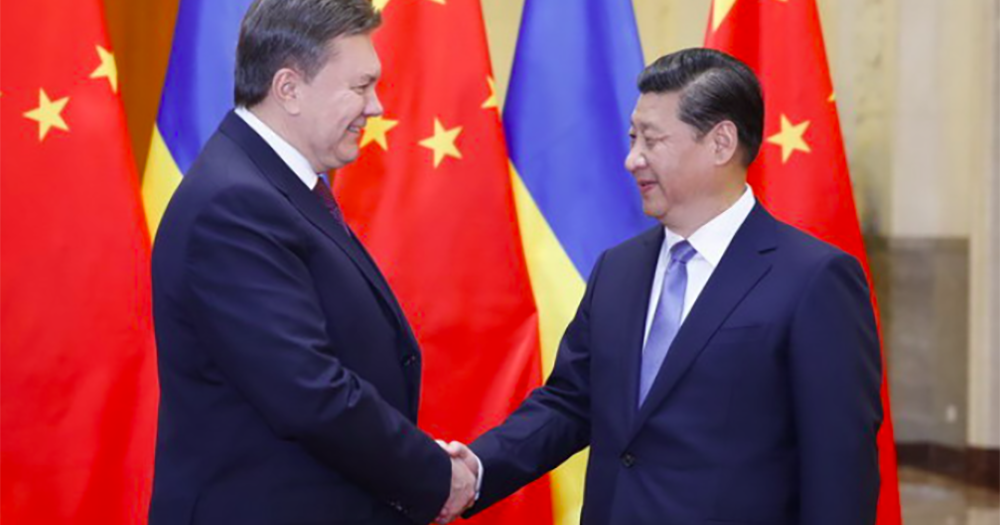Follow us on Telegram for the latest updates: https://t.me/mothershipsg
A promise that China made to Ukraine in 2013 regarding its defence has been brought back into attention in light of Russia's current invasion and Russian President Vladimir Putin's placing the country's nuclear forces on high alert.
China promised to guarantee Ukraine's security in light of a nuclear attack or threat
According to the Wall Street Journal (WSJ), Chinese President Xi Jinping had pledged that his country would defend Ukraine in the event it suffered a nuclear attack.
The pledge was signed with then-Ukrainian President Viktor Yanukovych, who had the backing of Russia, in December 2013 in Beijing.
It contained the following joint statement:
"China pledges unconditionally not to use or threaten to use nuclear weapons against non-nuclear Ukraine, and under the conditions of Ukraine suffering an invasion using nuclear weapons or suffering the threat of such kind of invasion, to provide Ukraine with corresponding security guarantees."
In addition, China also praised Ukraine for signing the Budapest Memorandum in 1994, in which the former Soviet state gave up the third-largest stockpile of nuclear weapons in exchange for the guarantee of its security by Russia, the U.S. and the UK.
The statement further said that both China and Ukraine support each other in efforts to defend each state's sovereignty and territorial integrity.
Yanukovych was subsequently toppled in February 2014 by protests partly triggered by his decision to reject a partnership with the European Union.
However, China appeared to send a signal that its pledge was to Ukraine, and not Yanukovych when the country's legislative body ratified the pledge in 2015.
More about flexing than substance
During the same month in which Yanukovych was toppled, Russia sent its troops into Ukraine's territory of Crimea.
Aljazeera reported that following this move, Russia reached out to China for "international support" but was met largely with silence, supposedly because of the nuclear pledge.
However, analysts on China who were interviewed by the media outlet said that the deal was more likely about sending a message over territorial disputes in Asia, such as the Diaoyu-Senkaku Islands and the South China Sea.
An Austria-based Chinese political analyst and international relations professor, Yu Ligong, was quoted as saying:
"Through this agreement with Ukraine, China wanted to paint a new face: 'We won’t apply nuclear weapons, but we are a nuclear power. You should not forget.' It’s a way to show muscle."
China: Security assurance is triggered under "specific conditions"
On Mar. 3 at the regular press conference of China's Foreign Ministry, the issue of the 2013 nuclear pledge and whether China will take measures to protect Ukraine was raised by Japanese media outlet NHK News.
A ministry spokesperson, Wang Wenbin, sidestepped the matter, citing a United Nations resolution on security guarantees given to non-nuclear states such as Ukraine.
He added:
"The security assurances have clear limitations on the content and are triggered under specific conditions. On the Ukraine issue, the pressing task now is for all sides to remain calm and exercise restraint, de-escalate the situation and promote [a] political settlement."
U.S. warns China against helping Russia
On Mar. 14, the BBC reported that the U.S. has warned China against helping Russia in its invasion of Ukraine.
Unnamed U.S. officials claimed that China has signalled willingness to provide military aid to Russia.
In response, China's foreign ministry has accused the U.S. of spreading misinformation, while Russia has denied making such a request.
The allegations were made ahead of a meeting between U.S. National Security advisor Jake Sullivan and Chinese diplomat Yang Jiechi.
China has not condemned Russia and has said that Moscow's "legitimate concerns" must be taken into serious consideration.
China has also maintained that its trade with its northern neighbour will continue as per normal, amidst growing sanctions on Russia.
On Mar. 7, Chinese Foreign Minister Wang Yi reiterated China's strong ties with Russia, saying that they are each other's closest ally and strategic partner, and that China-Russia relations are the most important bilateral ties in the world.
Wang also said that China will provide urgent humanitarian aid to Ukraine and that it is prepared to play a "constructive role" in facilitating dialogue.
Follow and listen to our podcast here
Top photo via Xinhua
If you like what you read, follow us on Facebook, Instagram, Twitter and Telegram to get the latest updates.
